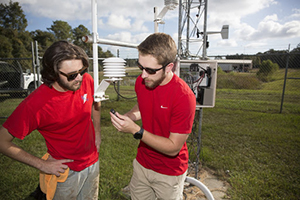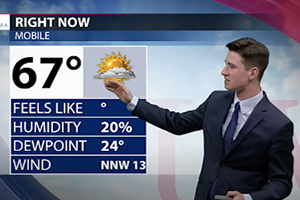Meteorology Curriculum and Tracks
Students pursuing a Bachelor of Science in Meteorology enroll in the core curriculum and choose one of three specialty tracks: professional meteorology track, broadcast meteorology track or graduate school track. South also offers a minor in meteorology.
Choose Your Track

Professional Meteorology
Prepare for employment with the National Weather Service, the military or employment with private weather forecasting services.

Broadcast Meteorology
Want a career in radio and television? The broadcast meteorology track gives students training and hands-on experience.

Graduate School
The graduate school track is available for students who would like to further studies in meteorology above the undergraduate curriculum.
Students pursuing a bachelor's in meteorology are required to take 49 semester hours of meteorology and 15 hours of mathematics, as well as courses in physics and statistics. In addition, basic education requirements must be met as set forth by the USA College of Arts and Sciences. A minimum of 120 semester hours is necessary for graduation.
Meteorology is a discipline that requires a strong background in mathematics. Therefore, it is essential that the student proceed as quickly as possible into calculus since it serves as the foundation for most meteorology and physics courses.
The meteorology curriculum consists of a core of 33 semester hours of meteorology courses plus three specialty tracks (16 semester hours each). Students must enroll in the core curriculum and choose at least one specialty track.
The detailed curriculum requirements for the major and minor in meteorology are below.
Meteorology Core Requirements (49 credit hours)
| Class Number | Course Description | Sem. Hours |
|---|---|---|
| MET 140/140L | Introduction to Meteorology | 4 |
| MET 341 | Climatology (W) | 3 |
| MET 353 | General Meteorology | 4 |
| MET 354 | Dynamic Meteorology I | 3 |
| MET 355 | Dynamic Meteorology II | 3 |
| MET 356 | Physical Meteorology | 4 |
| MET 454 | Synoptic Meteorology I | 6 |
| MET 455 | Synoptic Meteorology II | 6 |
| Total Core Course Hours: | 33 | |
| Total Hours, including one of the tracks listed below: | 49 | |
| Additional Requirements from Other Disciplines | ||
| Physics (8 credit hours) | ||
| PH 201 | Calculus Based General Physics I | 4 |
| PH 202 | Calculus Based General Physics II | 4 |
| Mathematics (18 credit hours) | ||
| MA 125 | Calculus I | 4 |
| MA 126 | Calculus II | 4 |
| MA 227 | Calculus III | 4 |
| MA 238 | Applied Differential Equations | 3 |
| ST 315 | Applied Probability and Statistics | 3 |
Professional Track (16 credit hours)
| Class Number | Course Description | Sem. Hours |
|---|---|---|
| MET 357 | Meteorological Instrumentation | 2 |
| MET 358 | Radar Meteorology | 4 |
| OR | ||
| MET 370 | Satellite Meteorology | 3 |
| MET 420 | Computer Applications in Earth Sciences | 4 |
| OR | ||
| GIT 460 | Intro to GIS | 4 |
| - AND - 6 or 7 additional elective credit hours | ||
| Graduate School Track (16 credit hours) | ||
| MET 420 | Computer Applications in Earth Sciences | 4 |
| MET 4XX | Any non-required 400-level class in major or minor | 2-4 |
| MET 358 | Radar Meteorology | 4 |
| OR |
||
| MET 370 | Satellite Meteorology | 3 |
| - AND - 4 or 7 additional elective credit hours | ||
| Broadcast Meteorology Track (16 credit hours) | ||
| MET 342 | Severe Weather | 3 |
| MET 358 | Radar Meteorology | 4 |
| MET 359 | Introduction to T.V. Weather | 2 |
| MET 496 | Internship in Meteorology | 1 |
| MET 497 | Broadcast Practicum I | 3 |
| - AND - 3 additional elective credit hours |
Meteorology Electives
| Class Number | Course Description | Sem. Hours |
|---|---|---|
| MET 191 | Tropical Discussion | 1 |
| MET 342 | Severe Weather | 3 |
| MET 357 | Meteorological Instrumentation | 2 |
| MET 358 | Radar Meteorology | 4 |
| MET 360 | Atmospheric Analysis | 1 |
| MET 370 | Satellite Meteorology |
3 |
| MET 410 | Meteorological Phenomenology (W) | 3 |
| MET 420 | Computer Applications in Meteorology | 4 |
| MET 430 | Mesoscale Meteorology | 3 |
| MET 440 | Air Pollution Meteorology | 3 |
| MET 442 | Tropical Meteorology | 2 |
| MET 456 | Applied Climatology (W) | 3 |
| MET 490 | Special Topics | 1-4 |
| MET 492 | Seminar | 1-4 |
| MET 494 | Directed Studies | 1-4 |
| MET 495 | Mesonet Internship | 1-2 |
| MET 496 | Internship in Meteorology | 1-3 |
| GEO 460 | Intro to GIS | 4 |
| GY 425 | Hydrology | 4 |
| MGT 300 | Management Theory and Practice | 3 |
| MKT 320 | Principles of Marketing | 3 |
EXAMPLE 4-YEAR METEOROLOGY PROGRAM
Professional Track - Mathematics Minor
First Math Course: MA 115
Total Semester Hours: 120
|
Year |
First Semester (Hrs) |
Second Semester (Hrs) |
|---|---|---|
| 1 | Mathematics 115 (4) | Mathematics 125 (4) |
| English 101 (3) | English 102 (3) | |
| Geography 115 (3) | History xxx (3) | |
| Language xxx (3) | Language xxx (3) | |
| Meteorology 191 (1) | Meteorology 140 (4) | |
| CAS 100 (2) | ||
| Total Hours - 16 | Total Hours - 17 | |
| 2 | Mathematics 126 (4) | Mathematics 227 (4) |
| Meteorology 353 (4) | Meteorology 341 (3) (W) | |
| Physics 201 (4) | Physics 202 (4) | |
| Communication 110 (3) | Meteorology 357 (2) | |
| History xxx (3) | ||
| Total Hours - 15 | Total Hours - 16 | |
| 3 | Mathematics 238 (3) | Statistics 315 (3) |
| Meteorology 354 (4) | Meteorology 355 (3) | |
| Meteorology 356 (4) | Meteorology 358 (4)* | |
| Fine Arts xxx (3) | Social Science xxx (3) | |
| Literature xxx (3) | Art/Humanity xxx (3) | |
| Total Hours - 16 | Total Hours - 16 | |
| 4 | Meteorology 454 (6) | Meteorology 455 (6) |
| Math Elective xxx (3) (W) | Meteorology 420 (4)** | |
| Met Elective xxx (4) | Met Elective xxx (3) | |
| Art/Humanity xxx (3) | Social Science xxx (3) | |
| Total Hours - 16 | Total Hours - 16 | |
| *Meteorology 358 (4) or Meteorology 370 (3) **Meteorology 420 (4) or Geography 460 (4) |
A student must take 20 semester hours of meteorology to declare a minor.
Meteorology Minor Courses (dropdown)
- MET 140 - Introduction to Meteorology (4 cr.)
- MET 353 - General Meteorology (4 cr.)
- MET 341 (W) - Climatology (3 cr.)
- - AND - 9 semester hours of electives from:
- MET 191 - Tropical Discussion (1 cr.)
- MET 342 - Severe Weather (3 cr.)
- MET 354 - Dynamic Meteorology I (3 cr.)
- MET 355 - Dynamic Meteorology II (3 cr.)
- MET 356 - Physical Meteorology (4 cr.)
- MET 357 - Meteorological Instrumentation (2 cr.)
- MET 358 - Radar Meteorology (4 cr.)
- MET 360 - Atmospheric Analysis (1 cr.)
- MET 370 - Satellite Meteorology (4 cr.)
- MET 401 - Weather Forecasting I (2 cr.)
- MET 402 - Weather Forecasting II (2 cr.)
- MET 410 (W) - Meteorological Phenomenology (3 cr.)
- MET 420 - Computer Applications in Earth Science (4 cr.)
- MET 430 - Mesoscale Meteorology (3 cr.)
- MET 440 - Air Pollution Meteorology (3 cr.)
- MET 442 - Tropical Meteorology (2 cr.)
- MET 456 (W) - Applied Climatology (3 cr.)
MET 191 may be taken up to 3 times for credit but will only count once toward the meteorology minor.
